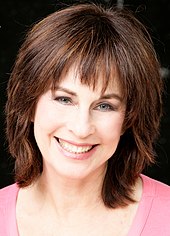Nurit Hirsh
Nurit Hirsh , also Hirsch ( Hebrew נורית הירש, born August 13, 1942 in Tel Aviv , Israel ) is an Israeli composer , arranger and conductor who has composed over 1,600 Hebrew songs. In 2016, Hirsh received the highest award of the State of Israel, the Israel Prize, for her services to Hebrew songs .
Life and musical career
Nurit Hirsh was born in Tel Aviv in 1942 to Hillel and Leah Hirsch. She completed her musical training with a focus on piano at the Academy for Music and Dance in Jerusalem . She also studied composition with Mordecai Seter , orchestration with Noam Sheriff , conducting with László Roth and clarinet with Yaacov Barnea of the Israel Philharmonic Orchestra . After completing her compulsory military service in the armored corps entertainment force, she began composing. The Israeli singer Chava Alberstein achieved great success with Hirsh's first song Perach Halilach (German: Die Fliederblüte ), which she had composed in 1965 to texts by Uri Asaf .
In the course of her life, Hirsh created more than 1,600 Hebrew songs. With her compositions she successfully took part in Israeli and international festivals and song competitions and won numerous prizes. Hirsh's song “Oseh Shalom”, which was composed in 1969 for the first Hasidic Song Festival and received the third prize there, has since been part of the liturgy in synagogues and Jewish communities around the world. Her world-famous compositions also include the song “BaShanah HaBa'ah” ( In the coming year ), with the text by Ehud Manor .
When Israel first took part in the Eurovision Song Contest in 1973, her song Ey Sham , performed by the singer Ilanit , came fourth in Luxembourg . Nurit Hirsh orchestrated the song and directed the orchestra herself in the competition . At that time she was only the second woman, after the Swede Monica Dominique, to appear as a conductor in this competition. In the 1978 Eurovision Song Contest in Paris , Israel won with A-Ba-Ni-Bi, composed and again self-conducted by Hirsh .
Hirsh wrote the score for fourteen Israeli films, including the feature film HaShoṭer Azulai (English: The Policeman ) by Ephraim Kishon , which was nominated for the best foreign film at the 1972 Oscars . She conducted the musical Sallah Shabati for three years at the Israeli National Theater Habima .
Nurit Hirsh has received numerous awards throughout her life, including honorary doctorates from two Israeli universities. In 2016 she received the Israel Prize.
family
Nurit Hirsh was married to the musician Yoram Rosenfeld , with whom she has two children. With her daughter Ruth Rosenfeld , an opera singer , Hirsh has performed together in places all over the world. Her son Daniel Rosenfeld is an instrumentalist.
Personal honors and awards (selection)
- 2001 ACUM Life Performance Award for Songwriting (ACUM = Association of Composers, Authors and Publishers of Music)
- 2006 Award Lifetime Achievement Award of Bar-Ilan University
- 2006 Israel Lions Club Woman of the Year award
- 2016 Israel Prize
- Honorary doctorate from Bar Ilan University
- Honorary doctorate from Ben Gurion University
Musical prizes (selection)
- 1972 Makhela Aliza , winner of the Malta Children's Song Festival
- 1973 Ey Sham , 4th place at the Eurovision Song Contest
- 1972 Hora nova , 2nd place at the Song Festival in Viña del Mar, Chile
- 1976 Lassie shuvi habaita , winner of the IBA children's festival
- 1976 I want to tell the world about you , 2nd place at the Castlebar Song Festival in ( Ireland )
- 1978 A-ba-ni-bi , winner of the 1978 Eurovision Song Contest
- 1979 Papa Popeye , winner of the Portuguese children's song festival in Figueira da Foz
- 1985 Shuvi harmonica , winner of the IBA Children's Festival
- 1985 Lo na'atsor , sung by Yardena Arazi
Web links
- Literature by and about Nurit Hirsh in the catalog of the German National Library
- Literature by and about Nurit Hirsh in the bibliographic database WorldCat
- Nurit Hirsh's website
- Alex Krauth: The Music of Nurit Hirsh. A Historical and Analytical Overview. (English)
- Nurit Hirsh conducts the winning song A-ba-ni-bi at the Eurovision Song Contest 1978 (YouTube).
- Celebration for the handover of the Israel Prize 2016 to Nurit Hirsh (Hebrew, YouTube)
Individual evidence
- ↑ a b Nathan Shahar: Nurit Hirsch - Jewish Women's Archive. In: jwa.org. Retrieved July 8, 2017 .
- ↑ Presentation by Nurit Hirsh , andtheconductoris.eu, accessed on July 8, 2017 (English).
| personal data | |
|---|---|
| SURNAME | Hirsh, Nurit |
| ALTERNATIVE NAMES | Rosenfeld, Nurit (married name); Deer, nurite (variant) |
| BRIEF DESCRIPTION | Israeli composer and conductor |
| DATE OF BIRTH | August 13, 1942 |
| PLACE OF BIRTH | Tel Aviv , Israel |
